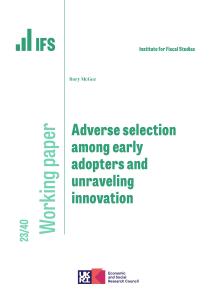We document considerable within-person (over time) variation in diet quality that is not fully explained by responses to fluctuations in the economic environment. We propose a two-selves model that provides a structural interpretation to this variation, in which food choices are a compromise between a healthy and an unhealthy self, each with well-behaved preferences. We show that the data are consistent with this model using revealed preference methods. The extent of self-control problems is higher among younger and lower income consumers, though this is overstated if we do not control for responses to fluctuations in the economic environment. Our results are intuitively related to stated attitudes on self-control.
Authors

CPP Co-Director, IFS Research Director
Rachel is Research Director and Professor at the University of Manchester. She was made a Dame for services to economic policy and education in 2021.

Research Fellow University of Wisconsin
Martin, previously Deputy Research Director, is a Research Fellow at IFS and Professor of Economics at the University of Wisconsin.

Research Fellow London School of Economics
Kate is an IFS Research Fellow and an Assistant Professor at LSE, interested in public finance, industrial organisation and applied microeconomics.

Research Associate Katholieke Universiteit Leuven
Laurens is a Research Associate of the IFS and a Professor in the Department of Economics, KU Leuven.

Research Associate Université libre de Bruxelles
Bram is a Research Associate of the IFS, a Professor of Economics at ULB and a Professor of Mathematics and Statistics at KU Leuven.

Research Associate University of Leuven
Frederic is a Research Associate of the IFS, a Professor of Economics at the University of Leuven and a Research Fellow at the CEPR.
Working Paper details
- Publisher
- CEPR
Suggested citation
Cherchye, L et al. (2017). A new year, a new you? Heterogeneity and self-control in food purchases. London: CEPR. Available at: https://ifs.org.uk/publications/new-year-new-you-heterogeneity-and-self-control-food-purchases (accessed: 30 June 2024).
Grant
Related documents
More from IFS
Understand this issue

Liberal Democrat manifesto: a reaction
10 June 2024

Retirement is not always a choice that workers can afford to make
6 November 2023

Conservative Party Conference: Can the next government afford the NHS?
Policy analysis

Tax and public finances: the fundamentals
23 August 2023

How do the last five years measure up on levelling up?
19 June 2024

A response to the Conservatives’ proposals to reduce growth in the health-related benefits bill
8 June 2024
Academic research

Saving by buying ahead: stockpiling in response to lump-sum payments
2 February 2024

Adverse selection among early adopters and unraveling innovation
18 December 2023

The role of hospital networks in individual mortality
13 May 2024